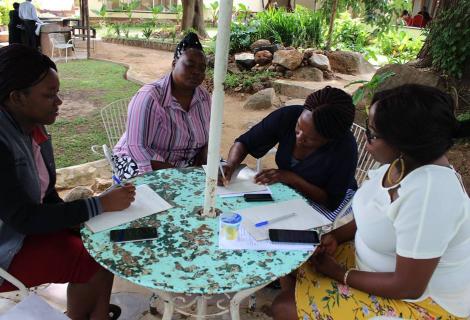Distribution of Unpaid Care Work open doors for women to engage in productive work

Having spent all my last 21 years of my life in a patriarchal society where work normally done by women has historically been relegated to second class status compared to work performed by men. l was privileged to be part of an unpaid care work refresher course which was held in Rusape, Makoni District of Manicaland Province of Zimbabwe.
At first l had no clue what to expect. Like every human being you start having wild imaginations of what to expect at any new things coming your way. At the back of my mind l thought the training was aimed at challenging our culture and orient women to challenge men. This thought made my journey very long and caused my anxiety levels to rise well above expectations. Eventually l arrived and got to experience the surprises the training had.
On my day of arrival, l got a glimpse of what unpaid care work was and how the concept was being taken up by different people in different communities. Unpaid care work was defined as all activities that go towards caring for a household such as cooking, cleaning, collecting water and firewood, caring for the ill, elderly, and children for no pay. Unpaid care work also includes voluntary community work. In our culture, women are the ones who engage in all the care work without men working with the women in most cases. It remains invisible even though care is a central human need and maintains every society.
Unpaid care work is invisible, not valued, takes time and energy, not considered in policy and decision making and subsidies the economy. Due to unpaid care work, women and girls have way too many responsibilities and cannot do any productive work. As such, the unpaid care work refresher was aimed at advocating for the distribution of care work in homes to ensure women to engage in productive work.
On the second day of the refresher, women from the rural women assembly who work with ActionAid Zimbabwe gave feedback of how the concept (unpaid care work) was being taken in their different communities. Some communities were taking up the concept so well and appreciating that there’s need for men to work with their wives to lessen the burden of care work and allow them to do other things which gives them income.
“Men in Binga felt sorry for their wives with the much work they used to do and started working with their wives fetching water using wheelbarrows as well as cooking when their wives are not at home,” said Georgina a woman from the rural women’s assembly.
However, in some communities the unpaid care work concept faced rejection from men and women. Ward 4 Chiendambuya, in Makoni is an example of a community where the concept of recognising unpaid care work and the burden it causes on women and pushing men to also do unpaid work was not accepted. Women themselves even misunderstood unpaid care work redistribution. They felt that if men do unpaid care work it would mean disrespecting their husbands or challenge culture whereas it simply highlights the importance of helping each other. Regardless of rejection from other communities, change is a process as it does not happen overnight.
Women from the refresher training really showed their interest in engaging in economic activities like selling clothes, opening flea-markets, selling tomatoes which gives them income.
“Distribution of unpaid care work helps reduce gender-based violence, increases love in families and empower women to do productive work,” said Betty Sithole, ActionAid Zimbabwe Programme and Policy Manager for Women’s rights e during her opening speech to unpack the concept of unpaid care work to participants.
Participants outlined solutions of re-distribution of unpaid care work in their various communities and devised ways of making the concept acceptable in communities and Zimbabwe as a whole. Some of the solutions included sensitization meetings for both men and women, use of tools especially time diaries to make people really see who is doing more work in a day in terms of gender, inclusion of the young generation during sensitization and engaging churches local authorities in issues of unpaid care work.
The unpaid care work refresher training was an eye opener for me in terms of issues to do with women’s rights. From the workshop, l learnt that being a woman is not a limitation or a disadvantage, but l am also able to equally engage in the work men do. This is made possible if we advocate for the distribution of unpaid care work in homes and communities. It is important for me as a young lady to be empowered and do productive work which gives me income apart from unpaid care work. Thanks to the unpaid care work refresher for the priceless knowledge.